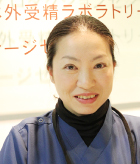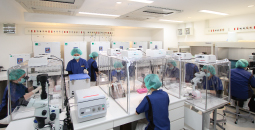

Embryology Specialist Namiko Amano
Embryology specialists are indispensable for reproductive medicine such as in vitro fertilization and intracytoplasmic sperm injection.
The skills of embryologists are key to the success of fertility treatment, yet, there is no opportunity for patients to directly experience the work of embryology specialists during their treatment.
To help remedy this, we approach the work of an embryologist through the story of Namiko Amano, who has been with Oak Sumiyoshi for 15 years.
Embryologists are responsible for the gametes (eggs and sperm) collected from patients for IVF and ICSI. They fertilize eggs with sperm in the lab and cultivate them, and manage them until transplantation or freezing.
The road to becoming an embryologist and culture specialist often starts with being a clinical laboratory technician, nurse, or pharmacist, and studying both theory and practice through a hospital like Oak Clinic.
As assisted reproductive technology has become more common, there is an increasing number of people whose goal is to be an embryologist from the beginning of undergraduate education as well.
Generally, people study specialized skills in university, get a job at a clinic, and practice to become an embryologist. There are also institutions that offers specialized training.
Practical experience, and final qualifications usually come from work at a clinic.
While there is no national certification for embryologists, the Japanese Society of Oocytes and the Japanese Clinical Embryology Society both sponsor certifications, which are required for embryologists at Oak Clinic.
In order to obtain the certification, it is essential to gain practical experience at a facility approved by the Japan Society of Obstetrics and Gynecology, participate in an academic society established by the Oocyte Society, and take a seminar. You must pass the exam and the interview (oral exam).
Even as a certified embryologist, one does not begin working with patient treatment directly. There is also on-the-job training.
With patient consent, eggs, sperm, and embryos discarded by those patients can be used in technical practice (such as freezing and thawing and transportation techniques) for new embryologists.
In this way, we can nurture younger generations of embryologists in our hospital’s education center, which has the same equipment used for actual work installed exclusively for practice.
We have a system in which only specialists who meet certain criteria are involved in the treatment of patients after exhaustive training with real gametes and equipment.
We know how important every case is, and work hard to ensure there are not individual differences in skills.
In addition, we take in training, academic society meetings, and information provided by vendors as needed, and try to incorporate the knowledge of the reproductive medical industry, which is advancing day by day.

Not only knowledge but also technique is important for embryologists, and the number of cases handled has a great influence on the improvement and maintenance of technique.
In addition, the capacity of the entire culture room depends on manpower and synchronized skill levels.
From basic things such as double check and triple check when handling gametes to things related to fertilization and culture techniques, our embryologists share many cases every day, and the skills of individual embryo incubators should match.
We believe that we can create a safe culture environment that does not put a burden on embryos, eggs, and sperms by improving the coordination of operations as much as possible.